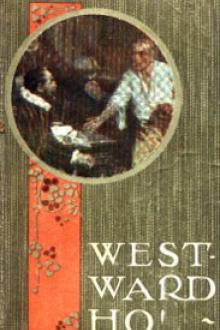Westward Ho! Or, The Voyages and Adventures of Sir Amyas Leigh, Knight, of Burrough, in the County of Devon, in the Reign of Her Most Glorious Majesty Queen Elizabeth by - (acx book reading .TXT) 📖

- Author: -
Book online «Westward Ho! Or, The Voyages and Adventures of Sir Amyas Leigh, Knight, of Burrough, in the County of Devon, in the Reign of Her Most Glorious Majesty Queen Elizabeth by - (acx book reading .TXT) 📖». Author -
“Never mind,” says Cary; “she can neither dive nor fly, and as long as she is above water, we—What is the admiral about?”
He is signalling Lord Henry Seymour and his squadron. Soon they tack, and come down the wind for the coast of Flanders. Parma must be blockaded still; and the Hollanders are likely to be too busy with their plunder to do it effectually. Suddenly there is a stir in the Spanish fleet. Medina and the rearmost ships turn upon the English. What can it mean? Will they offer battle once more? If so, it were best to get out of their way, for we have nothing wherewith to fight them. So the English lie close to the wind. They will let them pass, and return to their old tactic of following and harassing.
“Good-bye to Seymour,” says Cary, “if he is caught between them and Parma's flotilla. They are going to Dunkirk.”
“Impossible! They will not have water enough to reach his light craft. Here comes a big ship right upon us! Give him all you have left, lads; and if he will fight us, lay him alongside, and die boarding.”
They gave him what they had, and hulled him with every shot; but his huge side stood silent as the grave. He had not wherewithal to return the compliment.
“As I live, he is cutting loose the foot of his mainsail! the villain means to run.”
“There go the rest of them! Victoria!” shouted Cary, as one after another, every Spaniard set all the sail he could.
There was silence for a few minutes throughout the English fleet; and then cheer upon cheer of triumph rent the skies. It was over. The Spaniard had refused battle, and thinking only of safety, was pressing downward toward the Straits again. The Invincible Armada had cast away its name, and England was saved.
“But he will never get there, sir,” said old Yeo, who had come upon deck to murmur his Nunc Domine, and gaze upon that sight beyond all human faith or hope: “Never, never will he weather the Flanders shore, against such a breeze as is coming up. Look to the eye of the wind, sir, and see how the Lord is fighting for His people!”
Yes, down it came, fresher and stiffer every minute out of the gray north-west, as it does so often after a thunder-storm; and the sea began to rise high and white under the “Claro Aquilone,” till the Spaniards were fain to take in all spare canvas, and lie-to as best they could; while the English fleet, lying-to also, awaited an event which was in God's hands and not in theirs.
“They will be all ashore on Zealand before the afternoon,” murmured Amyas; “and I have lost my labor! Oh, for powder, powder, powder! to go in and finish it at once!”
“Oh, sir,” said Yeo, “don't murmur against the Lord in the very day of His mercies. It is hard, to be sure; but His will be done.”
“Could we not borrow powder from Drake there?”
“Look at the sea, sir!”
And, indeed, the sea was far too rough for any such attempt. The Spaniards neared and neared the fatal dunes, which fringed the shore for many a dreary mile; and Amyas had to wait weary hours, growling like a dog who has had the bone snatched out of his mouth, till the day wore on; when, behold, the wind began to fall as rapidly as it had risen. A savage joy rose in Amyas's heart.
“They are safe! safe for us! Who will go and beg us powder? A cartridge here and a cartridge there?—anything to set to work again!”
Cary volunteered, and returned in a couple of hours with some quantity: but he was on board again only just in time, for the south-wester had recovered the mastery of the skies, and Spaniards and English were moving away; but this time northward. Whither now? To Scotland? Amyas knew not, and cared not, provided he was in the company of Don Guzman de Soto.
The Armada was defeated, and England saved. But such great undertakings seldom end in one grand melodramatic explosion of fireworks, through which the devil arises in full roar to drag Dr. Faustus forever into the flaming pit. On the contrary, the devil stands by his servants to the last, and tries to bring off his shattered forces with drums beating and colors flying; and, if possible, to lull his enemies into supposing that the fight is ended, long before it really is half over. All which the good Lord Howard of Effingham knew well, and knew, too, that Medina had one last card to play, and that was the filial affection of that dutiful and chivalrous son, James of Scotland. True, he had promised faith to Elizabeth: but that was no reason why he should keep it. He had been hankering and dabbling after Spain for years past, for its absolution was dear to his inmost soul; and Queen Elizabeth had had to warn him, scold him, call him a liar, for so doing; so the Armada might still find shelter and provision in the Firth of Forth. But whether Lord Howard knew or not, Medina did not know, that Elizabeth had played her card cunningly, in the shape of one of those appeals to the purse, which, to James's dying day, overweighed all others save appeals to his vanity. “The title of a dukedom in England, a yearly pension of 5000 pounds, a guard at the queen's charge, and other matters” (probably more hounds and deer), had steeled the heart of the King of Scots, and sealed the Firth of Forth. Nevertheless, as I say, Lord Howard, like the rest of Elizabeth's heroes, trusted James just as much as James trusted others; and therefore thought good to escort the Armada until it was safely past the domains of that most chivalrous and truthful Solomon. But on the 4th of August, his fears, such as they were, were laid to rest. The Spaniards left the Scottish coast and sailed away for Norway; and the game was played out, and the end was come, as the end of such matters generally comes, by gradual decay, petty disaster, and mistake; till the snow-mountain, instead of being blown tragically and heroically to atoms, melts helplessly and pitiably away.
CHAPTER XXXII HOW AMYAS THREW HIS SWORD INTO THE SEA “Full fathom deep thy father lies; Of his bones are corals made; Those are pearls which were his eyes; Nothing of him that doth fade, But doth suffer a sea-change Into something rich and strange; Fairies hourly ring his knell, Hark! I hear them. Ding dong bell.” The Tempest.
Yes, it is over; and the great Armada is vanquished. It is lulled for awhile, the everlasting war which is
 Have you ever thought about what fiction is? Probably, such a question may seem surprising: and so everything is clear. Every person throughout his life has to repeatedly create the works he needs for specific purposes - statements, autobiographies, dictations - using not gypsum or clay, not musical notes, not paints, but just a word. At the same time, almost every person will be very surprised if he is told that he thereby created a work of fiction, which is very different from visual art, music and sculpture making. However, everyone understands that a student's essay or dictation is fundamentally different from novels, short stories, news that are created by professional writers. In the works of professionals there is the most important difference - excogitation. But, oddly enough, in a school literature course, you don’t realize the full power of fiction. So using our website in your free time discover fiction for yourself.
Have you ever thought about what fiction is? Probably, such a question may seem surprising: and so everything is clear. Every person throughout his life has to repeatedly create the works he needs for specific purposes - statements, autobiographies, dictations - using not gypsum or clay, not musical notes, not paints, but just a word. At the same time, almost every person will be very surprised if he is told that he thereby created a work of fiction, which is very different from visual art, music and sculpture making. However, everyone understands that a student's essay or dictation is fundamentally different from novels, short stories, news that are created by professional writers. In the works of professionals there is the most important difference - excogitation. But, oddly enough, in a school literature course, you don’t realize the full power of fiction. So using our website in your free time discover fiction for yourself. 




Comments (0)